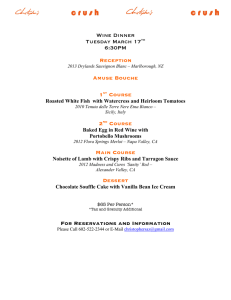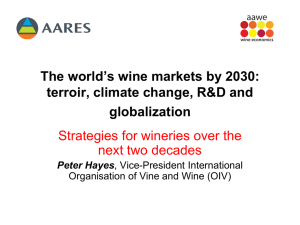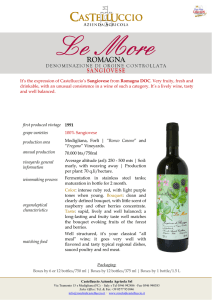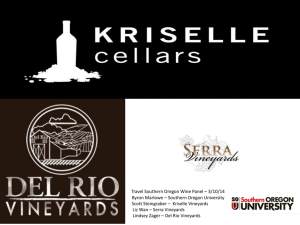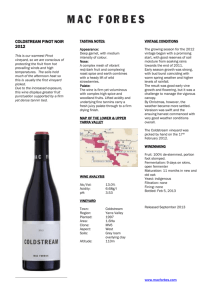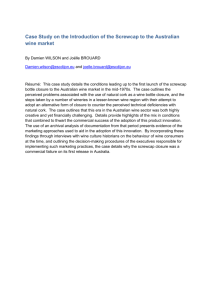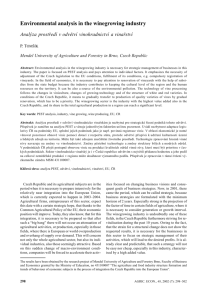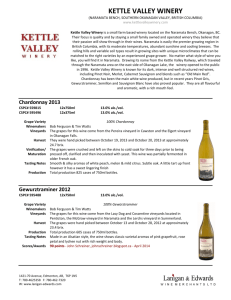PEOPLE, POLITY, AND POLITICS - Ozaukee Congregational Church
advertisement
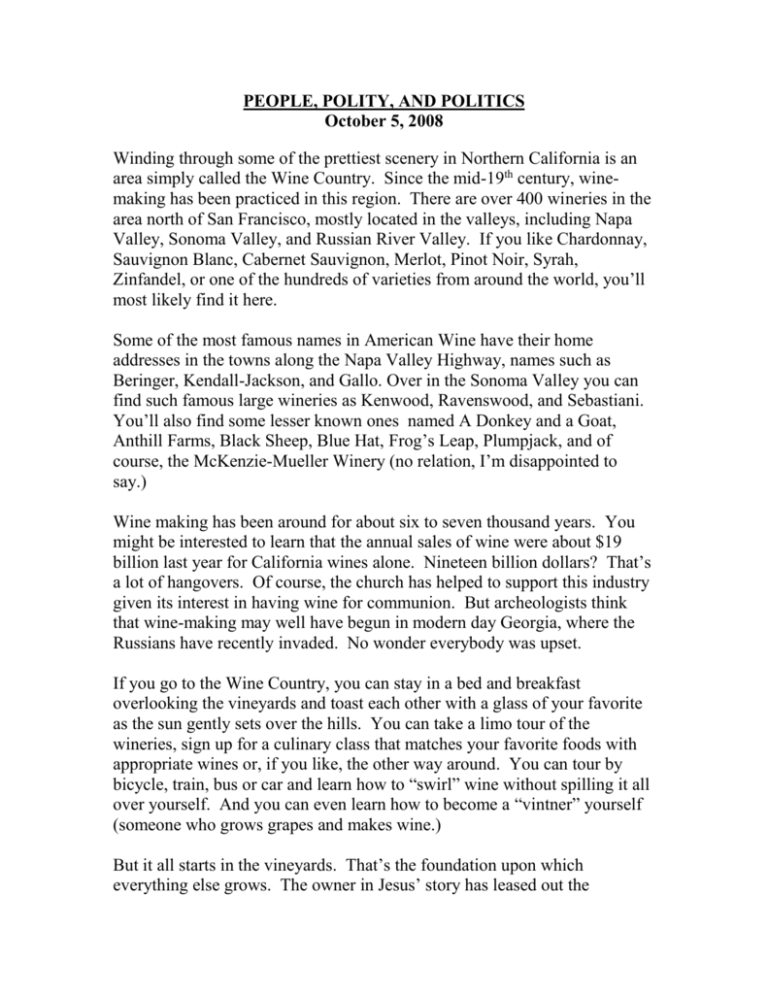
PEOPLE, POLITY, AND POLITICS October 5, 2008 Winding through some of the prettiest scenery in Northern California is an area simply called the Wine Country. Since the mid-19th century, winemaking has been practiced in this region. There are over 400 wineries in the area north of San Francisco, mostly located in the valleys, including Napa Valley, Sonoma Valley, and Russian River Valley. If you like Chardonnay, Sauvignon Blanc, Cabernet Sauvignon, Merlot, Pinot Noir, Syrah, Zinfandel, or one of the hundreds of varieties from around the world, you’ll most likely find it here. Some of the most famous names in American Wine have their home addresses in the towns along the Napa Valley Highway, names such as Beringer, Kendall-Jackson, and Gallo. Over in the Sonoma Valley you can find such famous large wineries as Kenwood, Ravenswood, and Sebastiani. You’ll also find some lesser known ones named A Donkey and a Goat, Anthill Farms, Black Sheep, Blue Hat, Frog’s Leap, Plumpjack, and of course, the McKenzie-Mueller Winery (no relation, I’m disappointed to say.) Wine making has been around for about six to seven thousand years. You might be interested to learn that the annual sales of wine were about $19 billion last year for California wines alone. Nineteen billion dollars? That’s a lot of hangovers. Of course, the church has helped to support this industry given its interest in having wine for communion. But archeologists think that wine-making may well have begun in modern day Georgia, where the Russians have recently invaded. No wonder everybody was upset. If you go to the Wine Country, you can stay in a bed and breakfast overlooking the vineyards and toast each other with a glass of your favorite as the sun gently sets over the hills. You can take a limo tour of the wineries, sign up for a culinary class that matches your favorite foods with appropriate wines or, if you like, the other way around. You can tour by bicycle, train, bus or car and learn how to “swirl” wine without spilling it all over yourself. And you can even learn how to become a “vintner” yourself (someone who grows grapes and makes wine.) But it all starts in the vineyards. That’s the foundation upon which everything else grows. The owner in Jesus’ story has leased out the 2 vineyard and periodically sends someone to collect the rent. One day, the owner sends his servants for the rent money. This is where the story takes a shocking turn. The tenants beat up the servants, killing one of them. Another group is sent, and they get the same brutal treatment. Finally, the owner sends his own son to collect what is due, thinking they will surely pay attention to him, but the tenants seize the son and kill him, too. So much for the pleasant wine country tour! The story has become a tragedy, a tale of greed, violence, and sorrow. As Jesus tells this parable, it is the chief priests and the elders who are standing nearby and are the target of his story. As they hear this account of rebellion and disobedience, they become indignant and say, “Why, those wretches ought to die!” That’s when Jesus cuts to the chase. He says that the owner’s son is like the stone which the builders rejected and then God took it and made the cornerstone. Suddenly, it dawns on Jesus’ listeners what this story is about. The vineyard is Israel. The owner is God. The tenant farmers are the religious leaders, entrusted with leading the people to fruitful obedience. The messengers were the prophets of Israel, who were rejected. And the son, the son is Jesus. And now the spotlight falls on the religious leaders. What will they do with God’s son, who has come to claim his due? And by implication, we too face the same question. What will we do with the vineyards entrusted to us and will we give God his due? Will we be good stewards of the land and share the fruits of our labor? Or will we be self-absorbed and greedy, concerned only with our own selfish desires. When the early church collected the stories for the Gospels, they chose to include this parable. It was a word of warning to the church then and now. It was a warning to all religious groups. Be careful lest you forget you are only tenants. Be careful lest you not listen to the servants or the prophets that God sends. Be careful when the owner sends his son that you do not ignore him or crucify him yet again. We forget that this is God’s world and that we are only the tenants. Maybe it’s a human being type of thing, but is sure seems like we can point fingers a lot and try to excuse our own responsibility. Like the religious leaders, we want to say how awful the tenants acted – without having to look at our own attitudes and actions. Have you ever noticed how easy it is to draw up sides 3 and become adversaries instead of joining together for the causes of justice and peace? We’d sooner be competitors than fellow teammates. We do it in the church. We do it in politics? We do it as human beings. People, polity, and politics. But God wants something greater for us. Maybe our task is to stop pointing fingers. Maybe it isn’t the liberals or the conservatives to blame. Maybe it isn’t fundamentalists, or the government or the gays or the immigrants, conservative talk radio, or the Lutherans. We are those tending the vineyards that God has so graciously given to us. We are those who have responsibilities to share what God has blessed us with. We are to receive those God sends our way. And we are to make sure that when God walks down our street and stops at our house, we do not miss God. Remember what happened that first Christmas in Bethlehem or even your last Christmas. Did you see the Christ child? Did you embrace him and invite him in or did you send him away? Today is World Communion Sunday, started by the Presbyterians way back in 1936. Today, we all drink from the same cup and eat of the same loaf in recognition that despite our differences of partisan politics, polity and creed, we are one in God’s spirit. In response to this great truth, some churches will take up a special offering for sister churches around the world. Others will ask for donations to help fight world hunger. And other churches will join with local congregations in symbolic acts of common worship. What will you do? How will you see your responsibilities as tenants of the vineyard and your willingness to respond with appreciation to the gift afforded you? As we prepare to take communion this morning with fellow Christians around the globe, let’s be reminded that each of us is called, not just to celebrate the common-taking of the bread and wine, but called to be those who build bridges of compassion and peace. You may not think that you can very much, but I want to challenge you. In the mid-1800s, when engineers began work on a suspension bridge across Niagara Falls, the first problem they encountered was how to get the huge iron cables across the chasm. After studying and rejecting countless ideas, they came upon the solution: a kite. 4 Engineers attached a slender thread to a paper kite flown by a ten-year-old (who had proven himself a master at kite flying) and flew it across the falls to the opposite shore. Once the thread was fastened to a tree, workers used the thread to draw across a string, and then a cord, and then a rope – and finally the immense steel cable that was the beginning of the new bridge. You may be only a thread, but perhaps you can soar to heights that others cannot. You may be able to support others on their journeys across life’s most treacherous divides. It is Christ who calls us together as his church to build the bridge from our side to the other side. Don’t wait for others to reach out to you. Be a thread of hope, a person who is encouraged by him who was vulnerable and broken for us. On this World Communion Sunday, let’s be a church that celebrates that we are part of something much greater than our own four walls and country setting. Let’s recognize the goodness and greatness of the owner of the vineyard and our responsibility as good tenants to share all that we have and all that we are, with those he loves as well, both home and abroad. And in doing so, we receive Christ himself.
